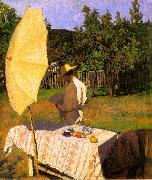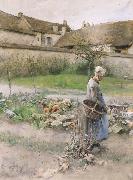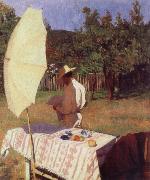Wholesale Oil Painting No Minimum |
|||||||||||
|
|
|||||||||||

|
|||||||||||
|
|
|
||||||||
Karoly Ferenczy1863-1917 Karoly Ferenczy Locations was a Hungarian Impressionist painter. He was one of the leading artists of the Nagybanya school of painting. He studied law and economics. He began to deal with painting at the Academie Julian in Paris. In 1889, he moved back to Hungary, to the town of Szentendre. Between 1893 and 1896 he lived in Munich with his family: There he joined the circle of Simon Hollosy: with whom he moved to Nagybanya in 1896 and became the leading painter of the artist colony. After 1906 he moved to Budapest and became the professor of the College of Fine Arts. His wife Olga Fialka and their children, the painter Valer Ferenczy (1885-1954), the tapestry weaver Noemi Ferenczy (1890-1957) and the sculptor Beni Ferenczy (1890- 1967) were famous representatives of Hungarian art. |
||||||||
|
|
||||||||
October
October Painting ID:: 1207 |
1903
Hungarian National Gallery 1903 Hungarian National Gallery |
|||||||
|
|
||||||||
Carl LarssonSwedish Realist Painter, 1853-1919 Swedish painter, illustrator and printmaker. He came from a poor family and studied (1866-76) at the Konstakademi in Stockholm, supporting himself throughout this period. From 1871 to 1878 he contributed illustrations to the comic journal Kaspar and the Ny illustrerad tidning. From 1875, for several decades, he was a prolific book illustrator, his most renowned work in this field being his drawings for Föltskärns beröttelser ('The Barber-surgeon's tales'; pubd 1883-4) by Zacharius Topelius, and the Rococo-inspired watercolours for the Samlade skaldeförsök ('Collected attempts at poetry'; pubd 1884) by the 18th-century Swedish author Anna Maria Lenngren. |
||||||||
|
|
||||||||
|
|
October
October Painting ID:: 41578 |
mk163
Watercolor
1882/1883
mk163 Watercolor 1882/1883 |
||||||
|
|
||||||||
Karoly Ferenczy1863-1917 Karoly Ferenczy Locations was a Hungarian Impressionist painter. He was one of the leading artists of the Nagybanya school of painting. He studied law and economics. He began to deal with painting at the Academie Julian in Paris. In 1889, he moved back to Hungary, to the town of Szentendre. Between 1893 and 1896 he lived in Munich with his family: There he joined the circle of Simon Hollosy: with whom he moved to Nagybanya in 1896 and became the leading painter of the artist colony. After 1906 he moved to Budapest and became the professor of the College of Fine Arts. His wife Olga Fialka and their children, the painter Valer Ferenczy (1885-1954), the tapestry weaver Noemi Ferenczy (1890-1957) and the sculptor Beni Ferenczy (1890- 1967) were famous representatives of Hungarian art. |
||||||||
|
|
||||||||
|
|
October
October Painting ID:: 54387 |
mk235
1903
Oil on canvas
126x107cm
mk235 1903 Oil on canvas 126x107cm |
||||||
|
|
||||||||
James TissotFrench Painter, 1836-1902 French painter, printmaker and enamellist. He grew up in a port, an experience reflected in his later paintings set on board ship. He moved to Paris c. 1856 and became a pupil of Louis Lamothe and Hippolyte Flandrin. He made his Salon d?but in 1859 and continued to exhibit there successfully until he went to London in 1871. His early paintings exemplify Romantic obsessions with the Middle Ages, while works such as the Meeting of Faust and Marguerite (exh. Salon 1861; Paris. Mus. d'Orsay) and Marguerite at the Ramparts (1861; untraced, see Wentworth, 1984, pl. 8) show the influence of the Belgian painter Baron Henri Leys. In the mid-1860s Tissot abandoned these tendencies in favour of contemporary subjects, sometimes with a humorous intent, as in Two Sisters (exh. Salon 1864; Paris, Louvre) and Beating the Retreat in the Tuileries Gardens (exh. Salon 1868; priv. col., see Wentworth, 1984, pl. 45). The painting Young Ladies Looking at Japanese Objects (exh. Salon 1869; priv. col., see Wentworth, 1984, pl. 59) testifies to his interest in things Oriental, and Picnic (exh. Salon 1869; priv. col., see 1984 exh. cat., fig. 27), in which he delved into the period of the Directoire, is perhaps influenced by the Goncourt brothers. Tissot re-created the atmosphere of the 1790s by dressing his characters in historical costume. |
||||||||
|
|
||||||||
|
|
October
October Painting ID:: 82690 |
Date 1877(1877)
Medium Oil on canvas
Dimensions 216 x 108.7 cm (85 x 42.8 in)
cjr Date 1877(1877) Medium Oil on canvas Dimensions 216 x 108.7 cm (85 x 42.8 in) cjr |
||||||
|
|
||||||||
James Joseph Jacques TissotJames Jacques Joseph Tissot (15 October 1836 - 8 August 1902) was a French painter, who spent much of his career in Britain. Tissot was born in Nantes, France. In about 1856, he began study at the École des Beaux-Arts in Paris under Hippolyte Flandrin and Lamothe, and became friendly with Edgar Degas and James Abbott McNeill Whistler. Tissot exhibited in the Paris Salon for the first time in 1859, two portraits of women and three scenes in medieval dress from Faust. The latter show the influence of the Belgian painter Henri Leys (Jan August Hendrik Leys), whom he had met in Antwerp in 1859. In the mid-1860s, however, Tissot began to concentrate on depicting women, often although not always shown in modern dress. Like contemporaries such as Alfred Stevens and Claude Monet, Tissot also explored japonisme, including Japanese objects and costumes in his pictures. A portrait of Tissot by Degas from these years (Metropolitan Museum of Art, New York) shows him with a Japanese screen hanging on the wall. |
||||||||
|
|
||||||||
|
|
October
October Painting ID:: 86716 |
1877(1877)
Medium Oil on canvas
Dimensions 216 x 108.7 cm (85 x 42.8 in)
cyf 1877(1877) Medium Oil on canvas Dimensions 216 x 108.7 cm (85 x 42.8 in) cyf |
||||||
|
|
||||||||
|
James Joseph Jacques Tissot James Jacques Joseph Tissot (15 October 1836 - 8 August 1902) was a French painter, who spent much of his career in Britain. Tissot was born in Nantes, France. In about 1856, he began study at the École des Beaux-Arts in Paris under Hippolyte Flandrin and Lamothe, and became friendly with Edgar Degas and James Abbott McNeill Whistler. Tissot exhibited in the Paris Salon for the first time in 1859, two portraits of women and three scenes in medieval dress from Faust. The latter show the influence of the Belgian painter Henri Leys (Jan August Hendrik Leys), whom he had met in Antwerp in 1859. In the mid-1860s, however, Tissot began to concentrate on depicting women, often although not always shown in modern dress. Like contemporaries such as Alfred Stevens and Claude Monet, Tissot also explored japonisme, including Japanese objects and costumes in his pictures. A portrait of Tissot by Degas from these years (Metropolitan Museum of Art, New York) shows him with a Japanese screen hanging on the wall. October 1877(1877) Medium Oil on canvas Dimensions 216 x 108.7 cm (85 x 42.8 in) cyf |
||||||||
|
|
||||||||
|
Prev Next
|
||||||||
|
|
||||||||
|
Related Paintings to James Joseph Jacques Tissot :. |
||||||||
|
|
||||||||
|
CONTACT US |





